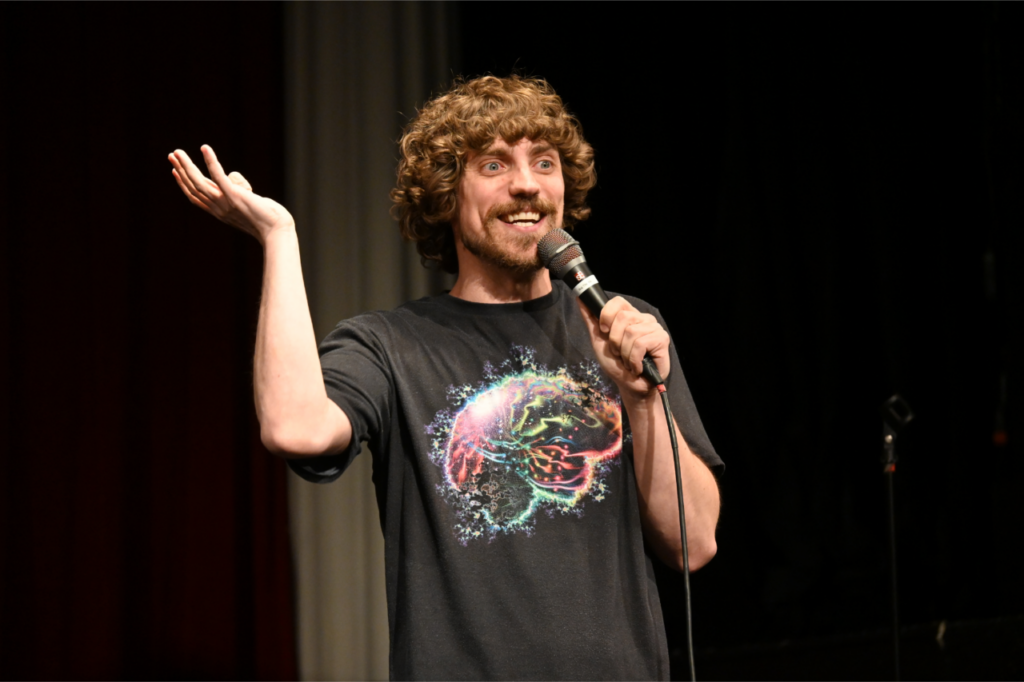Joe Huisman
Second Chance Comedy gives recovered addicts a creative outlet and sense of community
Joe Huisman struggled with cocaine and crack addiction in his twenties, and though he’s been drug-free for the last 25 years, it wasn’t until he started doing comedy in 2023 that he was able to pinpoint what led him down a path of destruction.
“If I look back at my childhood, I think the lack of connection and lack of belonging ultimately led me down that path of drug use,” he says. “When people feel they don’t have a place, they’re desperately trying to find a place to fit in, and that often looks like substance use.”
Someone had convinced him to take a comedy class, and he started telling jokes about his experience as an addict at open mics and small comedy shows in the Denver area. To his surprise, people approached him afterward to tell him that his material deeply resonated with them. They’d share their own addiction stories, and as Huisman heard more and more of them, he felt called to do something even bigger. Then he was laid off from his software job and had the time to make it happen.
Huisman reached out to fellow comics, including others in recovery, to see what they thought of a comedy show focused on addiction. Everyone said it was a great idea, but Huisman knew he had to be careful. Joking about addiction is risky, he says, so he only chose performers who aligned with his vision to create a safe space for addicts and those impacted by addiction to come together and laugh. He called the group Second Chance Comedy.
They did their first show at The Louisville Underground on May 12, and they’ve since done 13 shows across the state. They’re about to tour through Northern Colorado: They’ll be at The Rialto Theater in Loveland on Nov. 1, the Dickens Opera House in Longmont on Nov. 10, The Lincoln Center Magnolia Theater in Fort Collins on Dec. 5 and the Moxi Theater in Greeley on Dec. 8.
Huisman has more than a dozen comics on rotation, and he adds more to the lineup if they seem like a good fit. Every show is different because each performer brings their own addiction experience and comedic delivery to the stage.
“The key is finding people who were impacted by addiction emotionally and are able to tap into those emotions because they’re more sensitive to how that might land with the audience,” he says. “That builds connection, and that’s when we can laugh through it together. It’s a fine line between laughing at the pain and laughing through the pain.”
Laughing together
Von Sprecken was one of the first performers to join Second Chance Comedy, but not just because of his 10-year drug and alcohol addiction and time in rehab. He’d been a paramedic and worked in a dispatch office, and he’d lost his younger brother to alcoholism. His experience as a patient in the mental health care system, a first responder and a surviving family member meant that he had lots of material to work with. He’s also a full-time comedian who headlines shows across the country.

Von Sprecken
“Using humor as a creative outlet has been massively helpful for me,” Sprecken says. “People in recovery and people with mental health issues tend to be pretty sensitive, and there’s so much to express about life that normal words kind of don’t do it. The best comedy, to me, is when someone says something and everyone in the room is like, ‘I’ve always felt like that, but I never would have put words to it.’ Then everybody laughs at it together, and they’re like, ‘It’s not just me; we all struggle like this.’ That’s incredibly healing in addiction.”
Like Huisman, Sprecken didn’t have much in the way of connection growing up. As a child, he connected to funny TV characters, and when he found himself in the throes of addiction, comedy helped him through it. He didn’t have the confidence to get onstage until 2017, but when he did, he found a community. That community expanded even further when he joined Second Chance Comedy.
“When we all get together in a room and laugh, it’s kind of impossible to feel alone in that environment,” he says. “We want it to be fun and funny and break stigmas around addiction, but it also has to be uplifting, pro sobriety, pro mental health and pro whatever works for you. We don’t want to shame anyone. It’s more about bringing hope and levity to things that are otherwise really hard.”
Sprecken likes to riff on the irrational behaviors that come with addiction and point out the weird things people do, but not in a belittling way. Instead, he gets the audience to relax and admit that humans inherently do strange things, especially in addiction.
Huisman takes a similar approach, leaning on personal anecdotes that speak to the absurdity of human behavior while destigmatizing the experience of addiction.
“We’re not just like, ‘Hey, we’re addicts having fun, making jokes.’ We’re really trying to change how people think about addiction by sharing these stories,” Huisman says. “The way we treat mental health and addiction in this country, all the shame we put around it, I’m trying to chip away at that because nobody chooses that path. A lot of the people that come to our shows are in recovery, but I also want to reach people that aren’t in recovery because those are the minds that I want to change.”
A place for everyone
Most people are affected by addiction in some way or another, says Tara Check, another original Second Chance Comedy performer. She and Huisman met at a comedy class, and when he asked her to join him in the endeavor, she was hesitant at first. She isn’t an addict, but she grew up with older brothers who struggled with addiction, and she felt that their stories weren’t hers to tell. So, she decided to joke about her own experience as a bystander.
“When I’m talking about my brothers, I try not to speculate on anything that was going on with them but instead tell the story from my perspective,” Check says. “It helps that I love my brothers; you can see that coming through. Now that I’ve dug into this a bit, it’s made me think more about my experience, and it’s been a little bit of a therapy session as I try to work through all of this.”

Tara Check
Check’s material has struck a chord with many audience members who have watched loved ones suffer, some of whom have approached her after shows to express their gratitude. One woman told Check that her daughter was going through addiction and that she was glad she was sharing the voice of affected family members. Another person told her he felt like he needed to call his sister after the show because he never thought about the way his addiction impacted her. Those moments motivate Check to keep telling her story, even if she isn’t an addict herself.
“We’re sharing some of the darkest moments of our lives, and we’re doing it without judgment,” she says. “Maybe the people in the audience have things they regret or feel bad about, and they can say, ‘I shouldn’t feel so much shame or concern about this thing I did in the past.’ It’s the same with any illness; the person going through it is going through something awful, but you as a bystander are also having experiences that impact you.”
Looking forward
Since a majority of the audience has ties to addiction, Huisman works with venues to eliminate alcohol from the shows. There are few opportunities to see comedy in an environment that doesn’t involve alcohol, Check says, so creating sober spaces helps to serve a community that wasn’t being included in the comedy world before. But it isn’t just the people who have struggled with addiction that that appeals to: Anyone who chooses not to drink for various reasons can sip on a soda or iced tea during the show and not feel out of place. Check is seeing more of that as more people quit drinking altogether, become sober curious or simply prefer mocktails to alcoholic drinks.
As Second Chance Comedy grows, Huisman aims to give back to the community in different ways. He’s already partnered with Sobriety House, an addiction treatment center in Denver that caters to people who can’t afford to get help, many of whom are homeless or don’t have health insurance. Huisman’s goal is to raise $10,000 for Sobriety House through ticket sales by the end of the year, and he’s more than halfway there. He also wants to put on comedy workshops for people who are in recovery because many have expressed an interest in learning the craft.
Sprecken says the group is looking into doing college tours and following in the footsteps of other niche comedy shows that have traveled around the country. As a touring comedian himself, he sees a lot of potential in Second Chance Comedy and the community it appeals to.
“It’s an incredibly underserved niche, and yet it’s not a tiny niche,” he says. “There aren’t a lot of people who are trying to serve this subset of people where it’s like, ‘Come have a night out. There’s no pressure to drink.’ It’s weird that not more people have tried to get at this before us. Maybe we’re just at the right time and place in history.”







